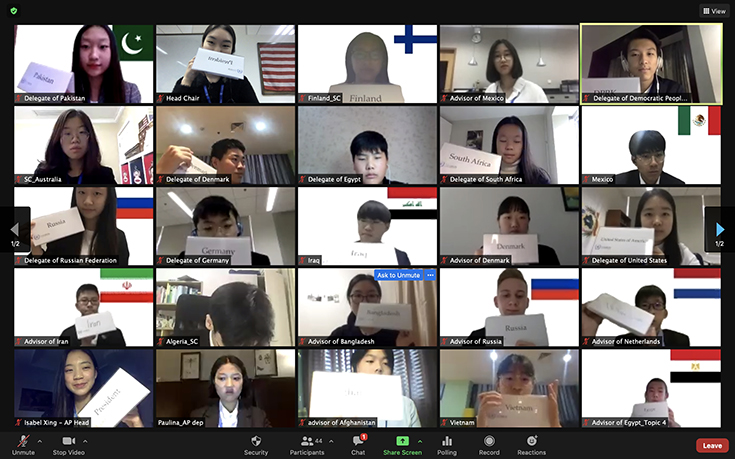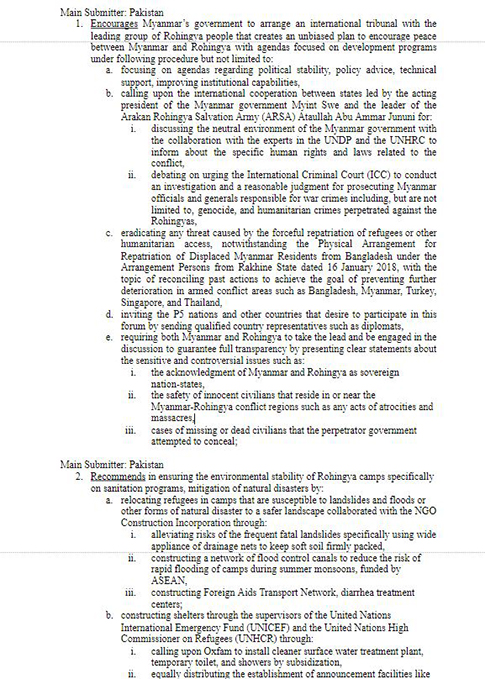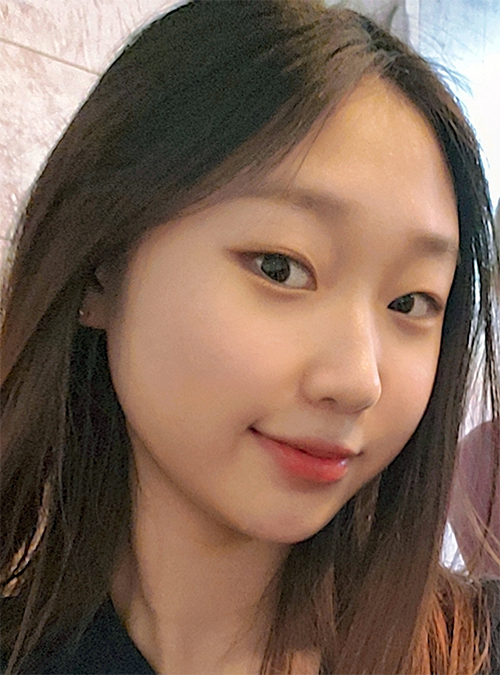With the unprecedented pandemonium brought by the COVID-19 pandemic, we have entered a new era referred to as the “New Normal.” At this transformational point in time, the world is experiencing challenges and instability due to the rapid transition from the former status quo. Because of these changes, radical pandemic responses need to be invested in, recognized, and amplified through efficient solutions that develop on multiple fronts. It is not a time to generalize change as normal but a time for inspiration and resilience that enhance trust in people and give them the opportunity to create change.
Held from November 19 to 21, the Tianjin Model United Nations (TIANMUN) is a three-day United Nations simulation for grades 8 to 12. With this year being its 8th iteration, TIANMUN 2020 was held completely virtually due to the COVID-19 pandemic. Students from schools all over China participated via Zoom meetings to develop and debate innovative solutions to current global conflicts. There were nine different committees this year: the General Assembly, Human Rights Council, Economic and Social Council, Disarmament Commission, Environment Commission, United Nations Education and Scientific and Cultural Organization, Advisory Panel, Security Council, and the Chinese committee. In accordance with the conference’s theme of global sustainable recovery, all delegates immersed themselves in a new paradigm of global sustainability.
I attended the conference as the delegate of Pakistan on the Security Council. Unlike my previous Model United Nations (MUN) experience, which was held in the UNA-USA format, TIANMUN’s rules of procedure adhered to that of The Hague International Model United Nations (THIMUN). With some of its procedures dating back to the British parliamentary procedure, THIMUN is a five-day simulation of the United Nations for secondary school students held in the World Forum Convention Center in The Hague. Although TIANMUN isn’t affiliated with THIMUN, delegates here engaged in lobbying instead of participating in an unmoderated caucus and conducted open and closed debate instead of a moderated caucus.

As a delegate of the Security Council, I followed a slightly different procedure than I had in other committees. The Security Council is the main organ responsible for maintaining international peace and security. It consists of 15 delegations with 5 permanent members and 10 non-permanent members. The 5 permanent members, also known as the P5 nations, consist of the United States, United Kingdom, Russian Federation, China, and France, which all have the power to veto a clause or a resolution. In TIANMUN 2020, a P5 caucus was not necessary because a veto was never raised. However, numerous amendments and more than 100 points of information were raised, resulting from the delegates’ eagerness to improve the quality of the resolutions on the topics of the situation in Djibouti, situation in Myanmar, and situation in Mali. After debating clause-by-clause on all three agendas, all resolutions were passed, and the delegates proceeded to a joint session with the Advisory Panel the next day.

On Saturday, the Security Council met with the Advisory Panel to review the Panel’s resolutions during the joint session. Two of the Advisory Panel’s resolutions were debated together and voted on by the members of the Security Council. The first topic, “Measures to Reduce Water Shortages and Implement Clean Water Sanitation in Yemen,” was passed with an overwhelming majority, but the second topic, “Measures to Implement a National Science, Technology, and Innovation (STI) System in Relation to Health and Medical Advancement in Sub-Saharan Africa” was not passed due to the lack of feasibility in the submitted resolution.
After three days of debating on five topics, I was awarded the Best Coalition Award. My eyes were bloodshot and my back sore from staring at my laptop’s screen for six hours straight, but I somehow managed to do as well as I did with my newly gained online multitasking skill. Despite this being my first time participating in an online MUN conference as a delegate of the Security Council, I believe that it was a chance to explore a new paradigm of not only the virtual MUN conference but also the post-pandemic world and develop new online conferencing strategies. As a member of the generation that will be living through the global post-pandemic recovery process, I believe that TIANMUN 2020 was a great opportunity to adopt universal responsibility as part of our “New Normal” and further contribute to forging a new future.

Angela Kim
Grade 10
Yantai Huasheng International School

